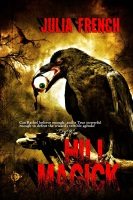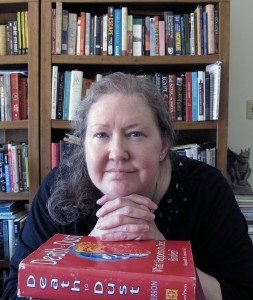
Hellnotes recently chatted with Julia about the inspiration behind the novel, her personal philosophy and sleeping naked in caves.
Hellnotes: How did the idea for Hill Magick come about?
Julia French: Shortly after I decided I wanted to pursue writing seriously I read the advice, “write what you love to read,” so I decided to try my hand at horror and the supernatural. I wrote a handful of stories in that genre, then wondered if I had it in me to write an entire book. I combined my interest in horror with my interest in folklore and natural healing, and Hill Magick evolved from that.
HN: Rachel is such a strong, conflicted character. She wants to leave her abusive husband and get on her own two feet, but then has moments of weakness where she convinces herself that he’ll change. You also share her husband Mark’s point of view in some scenes. Was it difficult tackling the subject of spousal abuse from the perspective of both the abuser and abusee?
JF: It was hard for me to write some scenes, and it was a relief when they were finished. I wanted to show the kind of thinking that kept Rachel captive in her failing marriage, and how she was able to break free of those false beliefs and start her life over. I also wanted to give some insight into Mark’s thought processes and show what made him act the way he did. An abusive person always feels justified in what they do. In Mark’s case his thoughts and conclusions made sense inside his own head (nowhere else!), but because he never developed the empathy and self-awareness that a mentally healthy person possesses he can’t understand that his actions are harmful. Rachel changes, True changes, but Mark is trapped in his dysfunctional mental prison.
HN: On a lighter note, the relationship between Rachel and True blossoms throughout the whole novel. Do you have any plans to revisit the characters in the future?
JF: Hill Magick is my first Yarwich novel. Yarwich is a very old city on the eastern seaboard where supernatural occurrences are commonplace. Right now I’m in the planning stages of a book that will provide an explanation for that, and it is possible that one or both of these characters would play a part in solving the mystery.
HN: Hill Magick discusses using nature as means for healing and protection. Do you believe that nature can heal? And are you a believer of magic?
JF: I believe that nature has the potential to heal through the remedies it provides, and also through the influence of natural environments like mountains, forests, lakes, etc. As for magic, that word has so many meanings. I do think that there are other planes of existence, untapped energies and hidden potentialities, and I believe that throughout history individuals have taught themselves to control and direct those forces for good or for evil. Don’t get me wrong, I’m very much pro-science – I mean, if it weren’t for science we would be sleeping naked in caves and gnawing on raw antelope haunches – but I believe there are things outside mainstream science that we are only beginning to be aware of, let alone understand. I also believe in the magic of the human heart.
HN: Did any real life experiences make their way into the pages of Hill Magick?
JF: Many authors bring personal experiences into their writing. I think it’s a natural thing to do, especially if an author has a unique perspective on a subject or an idea that they want to examine. Over the course of my life I have read a lot on occult, supernatural, and spiritual subjects, and I try to put that knowledge into what I write. I also spent a portion of my childhood living in a haunted house, so there’s that too.
HN: Which authors do you look up to and how have they inspired you?
JF: H. P. Lovecraft was my introduction into the world of horror. I was only eight years old, those stories scared the crap out of me, and I loved it. The man built up an entire universe with its own rules, history, and hierarchy, amazing in its day and still amazing today. M. R. James’s eerie stories have a folkloric-type of feeling and are true nightmare fodder. Even now I never read them right before bed, especially The Red Lodge. Algernon Blackwood has a way of building up a frightful atmosphere seemingly out of nothing, which I admire very much. The best example of that is The Willows, which might be the most terrifying story ever written. (Do NOT read that story if you love camping outdoors.) Robert McCammon’s Swan Song and Stephen King’s – well, any horror story by King – are entertaining, really scary, and just plain fun reads. That is what I aspire to do, as an author.
HN: Some writers have a space, like a writing room in their home, where their creativity flows. Do you have a space like that? What sort of items do you keep in it to inspire you?
JF: My “writing cave,” AKA my office, has dark blue denim curtains on the windows to shut out the world. I write on two utility tables angled to form an L. On top of those are wood crate bookshelves full of strange literature and reference works, and around those are various curios such as a reclining statue of Anubis, my favorite Egyptian god, a little souvenir otter carved out of anthracite coal, and geode chunks which I use for paperweights. I also have a tall filing cabinet full of papers that my computer and the internet have rendered obsolete. (Does anyone even use filing cabinets any more?) If the room were larger I’d love to put in a recliner, a mini-fridge, and a tv so I can watch reruns of Frasier and American Dad and pretend I am musing on story ideas and being productive.
HN: Your personal philosophy is that “knowledge is power, and it is better to turn around and face what is coming to get you rather than allow it to leap upon your back without warning.” Do you try to incorporate that philosophy into all of your stories?
JF: I try to. To know is to be prepared for the worst. I like to put in elements of mystery and hidden knowledge that the main characters must uncover before they can deal with the story problem, but just as people do in real life, they may or may not interpret that information correctly. Ignorance can kill, and what you don’t know could hurt you – a LOT.
HN: You’ve lived in a variety of places all over the world. How have the different cities, landscapes and cultures inspired your works? And if you could live anywhere in the world, where would it be?
JF: I really haven’t travelled that much. I’ve lived in California, Virginia, and Wisconsin, and I lived in Scotland for several years. I enjoy learning the various ways that people and cultures look at life. The different physical environments are interesting and beautiful too. Sometimes it’s helpful for me to visualize scenes in my stories taking place in real-life locations, as if I were filming them. If I could live anywhere in the world it would probably be Ireland. The scenery is fantastic, the culture is rich, and the people have a dry, lively sense of humor which I admire.
HN: What’s next for you?
JF: Right now, I hope to finish this five-book arc about the mystery of Yarwich. I see myself writing more Yarwich books in the future, but I would also like to get away to other places and explore fresh folkloric and supernatural topics. There could be a fantasy novel or two as well.
HN: Is there anything else you’d like to share with our readers?
JF: Read. Read anything you can get your hands on, fiction and nonfiction. Reading is food for the mind, and the mind is everything.
Julia French developed a taste for speculative fiction, horror, and the supernatural early in childhood. One of her most cherished memories is of sneaking horror and science fiction novels from the boxes her parents kept in the attic. Turning on her bedside lamp would have alerted them to the fact that she was not asleep, so she would lay the books upon the broad windowsill of her bedroom and read by the light of sunset until it was too dark to see the words on the page.
Working toward her degree in English literature taught French the elements of good literary style, and her degree in library science expresses how much she values the written word. She’s well grounded in non-fiction esoteric and occult reading, and she likes to incorporate that knowledge into her novels. Hill Magic, for example, shows how folk magic works and gives the flavor of how typical folk spells might sound.
French has to admit there is an element of glee in writing horror fiction. If something she’s written has caused one person to sleep with the lights on, avoid walking in the woods after dark, or refuse to go into their cellar, then that’s a job well done.









